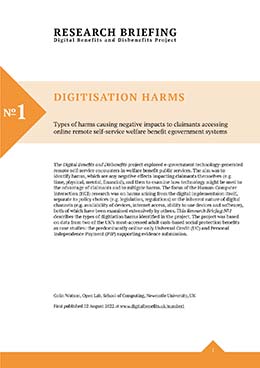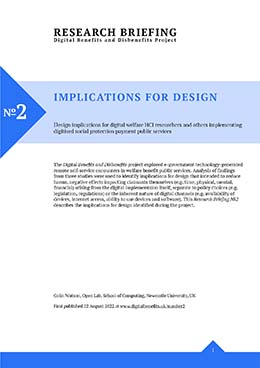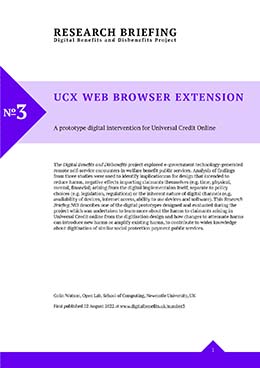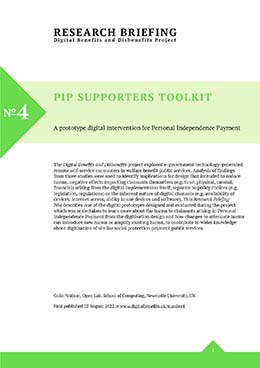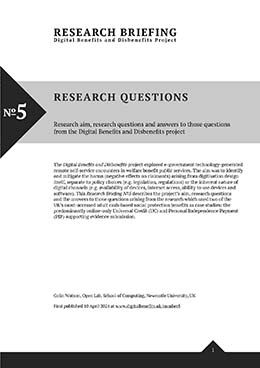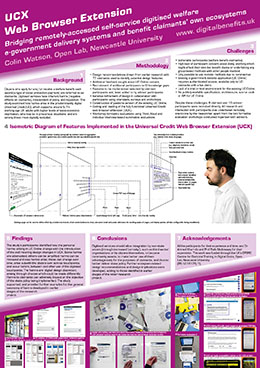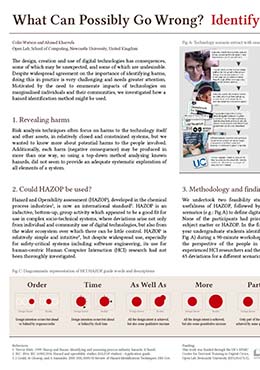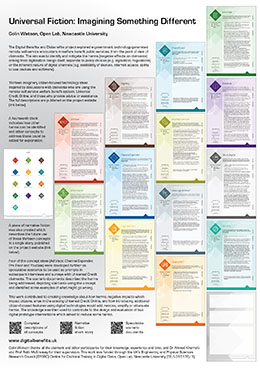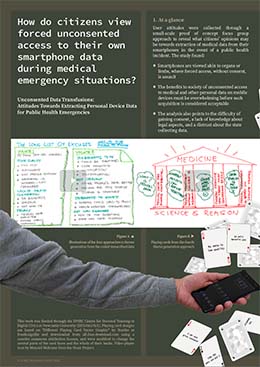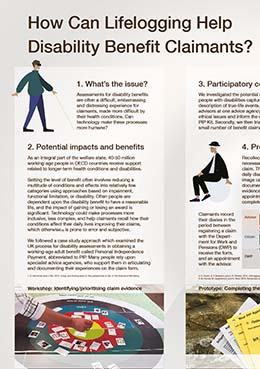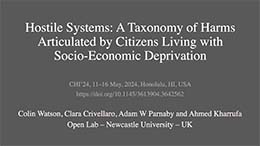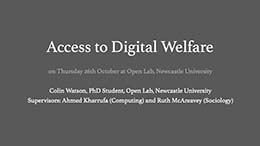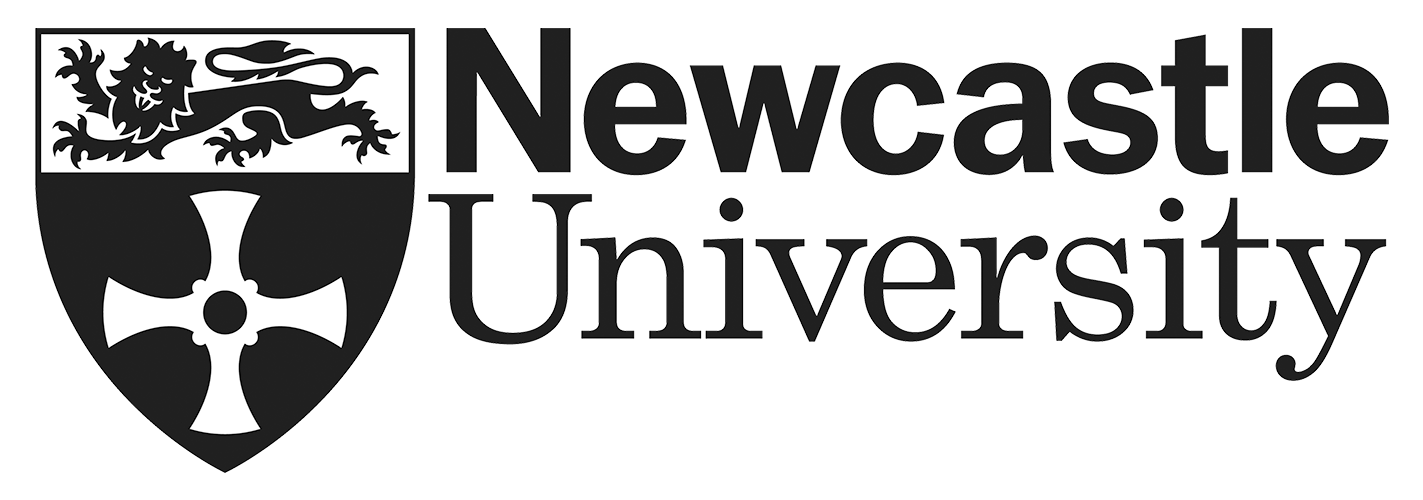Information from the Digital Benefits and Disbenefits Project
Public information appertaining to Colin Watson's doctoral qualitative human-computer interaction (HCI) research project Digital Benefits and Disbenefits, undertaken 2019–2023 at Open Lab, Newcastle University, UK.
The Digital Benefits and Disbenefits project explored e-government technology-generated remote self-service encounters in welfare benefit public services, from the point of view of claimants. The aim was to identify and mitigate the harms (negative effects on claimants) arising from digitisation design itself, separate to policy choices (e.g. legislation, regulations) or the inherent nature of digital channels (e.g. availability of devices, internet access, ability to use devices and software).
Research Briefings
Five documents describing outputs from the Digital Benefits and Disbenefits project.
RESEARCH BRIEFING N
Digitisation Harms
RESEARCH BRIEFING N
Implications for Design
RESEARCH BRIEFING N
UCX Web Browser Extension
RESEARCH BRIEFING N
PIP Supporters Toolkit
RESEARCH BRIEFING N
Research Questions
Academic Publications
The project led to writing a peer-reviewed paper with the title Hostile Systems: A Taxonomy of Harms Articulated by Citizens Living with Socio-Economic Deprivation, which was published in the proceedings of world's leading Human Computer Interaction Conference, the ACM Conference on Human Factors in Computing Systems Proceedings 2024 (CHI '24).
A draft paper was written describing the derivation of the earlier design recommendations and implications (included in Research Briefing N
Another published peer-reviewed paper arising from the project examines the use of a systematic hazard identification method to identify harms with the title HCI - H is also for Hazard: Using HAZOP to Identify Undesirable Consequences in Socio-Technical Systems, which was published in the ACM Conference on Computing and Sustainable Societies 2021 (COMPASS '21).
A previously published peer-reviewed paper, undertaken prior to this project, is related and examines preparing for an in-person appointment for Personal Independence Payment (PIP) paper claim form-filling appointment with the title PIP Kit: An Exploratory Investigation into using Lifelogging to support Disability Benefit Claimants, which was published in the ACM Conference on Human Factors in Computing Systems Proceedings 2020 (CHI '20).
These and Colin Watson's other publications are listed in the ACM Digital Library, at ResearchGate and in Google Scholar.
Posters
Posters and displays pertaining to work undertaken in the Digital Benefits and Disbenefits project and during prior research.
DIGITAL CIVICS EXCHANGE, NORTHUMBRIA UNIVERSITY, 2024
UCX Web Browser Extension
NEWCASTLE UNIVERSITY SCHOOL OF COMPUTING COMPETITION, 2022
What Can Possibly Go Wrong?
INTERMEDIATE DIGITAL DESIGN PROJECT ARTEFACTS, 2021
Universal Fiction Concepts
NEWCASTLE UNIVERSITY SAGE PGR CONFERENCE, 2021
Unconsented Data Transfusions
NEWCASTLE UNIVERSITY SAGE PGR CONFERENCE, 2020
How Can Lifelogging Help?
Videos
Two presentations have been recorded during the closing stages of the Digital Benefits and Disbenefits project.
PRESENTATION, ACM CHI '24, MAY 2024
Hostile Systems
LAB TALK, OPEN LAB, OCTOBER 2023
Access to Digital Welfare
Thesis
The research briefings and other outputs draw on the findings, analysis and discussion published in Colin Watson's thesis Understanding and Reducing the Negative Effects of Digitisation on Claimants' Access to Online Social Protection Services through the Design of Citizen-Controlled Digital Tools, supervised by Dr Ahmed Kharrufa (Open Lab, Newcastle University) and Professor Ruth McAreavey (Sociology, Newcastle University). Colin Watson qualified for the award Doctor of Philosophy in the School of Computing on 18 March 2024.
Digital Benefits and Disbenefits Cornucopia

Digital Benefits and Disbenefits Cornucopia (DBD Cornucopia) is an actionable practical tool created for teams which implement
welfare benefit e-government services. The tool's content is based on data collected from participants of the Digital Benefits and Disbenefits
project as described in the above thesis, the project's taxonomy of harms (included in Research Briefing N
Evidence to Government Bodies in 2024 and 2025
In the UK, the Works and Pensions Committee (WPC), a Commons Select Committee, examines the policies and spending of the Department for Work and Pensions (DWP). The WPC opened an inquiry into safeguarding vulnerable claimants in 2023 to ensure the DWP is adequately supporting those who find it difficult to interact with the benefit system. A call for evidence was published but was prematurely closed due to the general election and then re-opened again in autumn 2024. Findings and recommendations from the Digital Benefits and Disbenefits project were provided to the WPC who published them on parliament.uk together with all the inquiry's oral and written evidence.
In early 2025, the UK government's Department for Science, Innovation and Technology set out is approach to digital inclusion and launched a call for evidence about its proposed actions. Matters related to findings from the Digital Benefits and Disbenefits project were submitted as evidence.
Acknowledgements
The research would not have been possible without the expert knowledge of the participants who were primarily welfare benefit claimants but also others such as those providing advice, support and guidance about welfare benefits. Dr Ahmed Kharrufa and Professor Ruth McAreavey for their supervision. Dr Ahmed Kharrufa, Dr Clara Crivellaro and Adam Parnaby contributed to writing academic papers stemming from the project.
The research was undertaken within Open Lab in the School of Computing at Newcastle University. It was funded by the UK Research and Innovation’s Engineering and Physical Sciences Research Council (EPSRC) Centre for Doctoral Training in Digital Civics (EP/L016176/1), exploring how digital technologies can empower citizens and communities, and create real-world impact for partners Open Lab works with.

